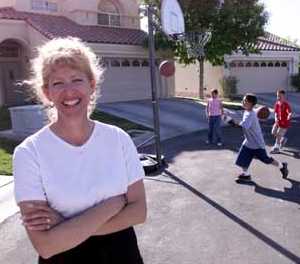| By JAN MOLLER
REVIEW-JOURNAL Sunday, May 05, 2002
At the heart of the controversy is a question of who has the right to regulate what takes place on a public street. If Scirone lived in a gated community, the street would belong to the association, not the city. But because her development is not gated, it's a city street subject to city laws. Randy Ecklund, executive director for Community Association Management, says that although the city of Las Vegas owns the street, the homeowners association has the right to fine anyone who leaves unsightly objects outside their house. That includes not just basketball hoops but motor homes, boats and similar objects that the association deems unacceptable. But Sharon Segerblom, director of the city's Neighborhood Services Department, isn't so sure. "I don't know if they have the right to do that or not," Segerblom said. Her department oversees the city's code-enforcement arm, which typically only responds to a problem if someone complains. Although mobile basketball hoops are common across the city, she said they rarely prompt complaints from neighbors. "We don't get a lot of complaints, but as you can imagine it can be a potential problem, especially at night," she said. Ecklund said the Summerlin association tries to take a more proactive approach to enforcing its rules and regulations. Instead of waiting for complaints to come in, the association has representatives who go out and look for problems. "We have community service representatives that do travel the various neighborhoods to keep an eye on various compliance issues," Ecklund said. "Much like the neighborhood code enforcement at the city, they're looking for the types of things that residents might complain about." Ecklund said basketball hoops aren't a problem as long as homeowners remove them from the street after their children are done playing. Scirone said none of her neighbors has complained about the hoop, and because she lives in a cul-de-sac it's hardly an impediment to traffic flow. After several Summerlin residents received similar letters about their basketball hoops, the association recently amended its bylaws to allow such hoops provided they are stored at least 40 feet from the front curb. The new bylaws also include restrictions on the type of colors and nets that are permitted, and advises homeowners that all "in-ground basketball equipment must be submitted to the Design Review Committee for approval." Far from solving the problem, Scirone and others complain that the new rule discriminates against homeowners whose lots aren't at least 40 feet deep. For those who can't afford oversized lots in more expensive parts of Summerlin, 40 feet from the curb often means their neighbor's back yard. "I'm being penalized because I don't live in a community where I can build a sports court," Scirone said. Eldon Hardy, the state's ombudsman for common-interest communities, said he's heard from dozens of Summerlin residents with complaints similar to Scirone's. "I've only heard that one about 1,000 times," joked Hardy, whose job is to try to resolve disputes between homeowners and their associations before they end up in court. "I can't make a determination on whether they have the right to leave them (basketball hoops) out there or not," Hardy said. "You try to abide by the governing documents of the association so you keep peace and harmony." But Hardy said the association's strict enforcement of its bylaws is "an area that's possibly a little bit overdone." Hardy said that although he's heard from dozens of neighbors who've received letters about their basketball hoops, he doesn't recall a complaint from someone who wanted their neighbor to take theirs down. Not wanting to anger the association, Scirone only takes out the basketball hoop on the weekends, when the association's representatives are less likely to come around looking for problems. During the week, she said, it stays in the garage because she doesn't have enough strength to drag it back and forth to the curb. After months of waiting for an answer on whether the hoop is legal or not, Scirone is getting fed up: "We're about to go to battle with them." |



